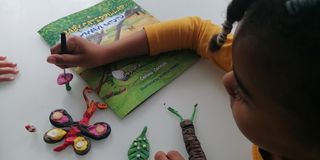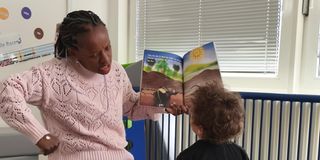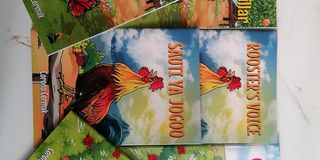'A child is a free mind': Author Corona Kimaro Cermak on storytelling, identity, and Tanzanian children’s literature

What you need to know:
- In Tanzania, reading to children is not a common practice, and both parents and teachers share responsibility for this. There is a pressing need to cultivate a reading culture, encouraging children to read for pleasure as they grow. Additionally, there is a lack of quiet spaces for children to read. Most homes don’t have children's books, and there are few engaging books in circulation that can spark children's interest.
It has been 58 years since the first International Children’s Book Day was observed. The children of that generation are now reaching retirement age in many countries, especially where the retirement age is 60. The questions are, however, tough, especially on whether the implementation of the 57 annual thematic resolutions has been taken seriously and incorporated into our formal and informal learning systems. This conversation with Ms Corona Cermak, an award-winning Tanzanian author of children’s books for the international audience, will be eye-opening. Her storytelling is exceptional as it emerges from a cultural convergent point to engage meaningfully with children both in Africa and in Europe.
Our readers would love to get to know you.
My name is Corona Kimaro Cermak; I am a Tanzanian, a lawyer by training, a teacher by practice, and an author of children’s books living in the Czech Republic. I am super happy to be part of this conversation on International Children’s Book Day, and I am thrilled by the theme 'The Freedom of Imagination' because it resonates with my core beliefs about children. Whenever I advertise my books or talk about children’s books, stories, or education, I always say, ‘A child is a free mind.’ I believe this will be a very interesting discussion.
What inspired you to start writing children’s books?
My most important motivation was my children, as I had a strong desire to teach them the Swahili language and culture. Because I live in the Czech Republic, I did not find books that satisfy that need. I looked for Swahili books and stories in Tanzania but had difficulty, and the few I found were expensive but also did not have the cultural merger I desired. Then, I decided to write stories for my children to help them learn the Swahili language and culture.

What role does your African heritage play in your storytelling?
My African heritage plays a crucial role in my storytelling. My Swahili culture and language largely constitute my identity as a storyteller. I want my children to joyfully explore and embrace their identity. Even though my children are half Czech and half Tanzanian, they are beautifully blended into both cultures. I believe that by having an awareness of the Swahili language and culture, they will better appreciate the Tanzanian side of who they are and be happy and free when they visit Tanzania. I did not read a lot of books as a child, but I dearly cherish memories of a storytelling radio programme back then dubbed Mama na Mwana, hosted by Deborah Mwenda. Both ways, we all have this heritage passed on to us in different ways.
How do you balance traditional storytelling with modern themes in your books?
I believe both the traditional and modern storytelling aim at the same thing: to teach. But nowadays, some stories teach nothing! I love the traditional way of storytelling because it is more engaging and interactive. In modern storytelling, the contact between the listener and the storyteller is not there.
In my children’s stories, I use songs and rhymes to engage them more deeply with the story, which eventually gives them that narrative encounter that characterised traditional African storytelling. This brings them holistically close to the real experience of the story’s world and fruitfully engages their imagination. My storytelling sparks excitement and discovery among children, particularly here in Europe, especially when it leads them to look beyond the common and immediate.
I also tell stories that address the problems of society today. I wrote a story titled Grandma Pipi and Roses for my son. He was being racially profiled and segregated at school. I presented in the story roses of different colours fighting, and there was a grandma there who tried to help solve their problem. The roses were arguing about which one was the most beautiful among them. This story confronted a real issue in life, where some people see others as less or ugly just based on the colour of their skin.

What do you think are the biggest barriers to children’s literacy and reading culture in Tanzania?
In Tanzania, reading to children is not a common habit. I blame parents and teachers. There is a need to nurture children into reading for pleasure to help them form their own reading culture as they grow up.
We also don’t have enough convenient places for children to read peacefully. Most of our homes do not have children's books, and there are few good books in circulation that children can read and get excited about. It gets more complex with the government bureaucracy to approve local books and have them accessible to children in schools. These practices work against our own success.
To help in this, parents and educators have a big role. But it will have to begin from the lowest levels by improving access and standards of delivery of basic education more widely so that most parents will themselves be able to read, even in the rural and remote areas. Twenty minutes of reading to a child and encouraging them to read for 20 minutes by themselves, if they can, will go a long way to build a reading habit in them.
What do you think African children’s literature offers to the global literary scene?
African children’s literature offers a lot, as it comes from a richness. We have left the outside world, especially to write for us and about us, for so long. Even their lies have become truths! What they teach in their schools about us is written by them, while we have little written about African cultures by Africans. As such, writing our own stories will bring a lot of change in the children’s world, and it will influence their imagination in a more productive and life-giving way. This is why I illustrate my children’s books in a Tanzanian way, including having the characters appear African.
It will also have a huge impact to invite Tanzanian writers, both adult and children's authors, to speak in schools in Tanzania, encouraging children to read fiction and write. Some children can eventually find their role models through these initiatives.

What advice would you give to young African authors who desire to write for children?
I advise them to write stories that will make children learn and laugh. Write what you believe will be educational, entertaining, and appropriate when read aloud to your own child. Listen to children: how they speak, how they fight/disagree, and how they solve their problems, so that you can communicate with them in their language and read children's books written by others, including children's authors, like Georgina Magessa, Gladness Eleazar, Raffat Simba, and others.
Any closing remarks?
First, I call upon local newspapers and radio stations to write about Tanzanian writers to make them and their work known. If we do not speak about our local stories and our local storytellers, nobody will truly know us, not even ourselves!
Secondly, I am very happy to contribute to this International Children's Book Day, which is celebrated on April 2, the birthday of children’s book writer Hans Christian Andersen. Just last month, I went to Copenhagen and visited the statue of The Little Mermaid, which is the title of one of his most popular children’s stories, published in 1837. In Tanzania, we need to support our local authors and make their work more meaningful to children in Tanzania and beyond.
Corona Cermak’s books can be purchased in all Elite Bookshops, at Mkuki na Nyota Bookshops, and on Amazon.





